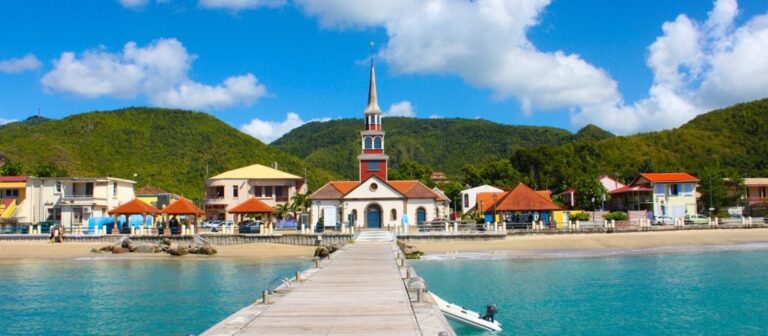Here is a comprehensive overview of Martinique, a beautiful French overseas region in the Caribbean:
Basic Facts about Martinique
| Feature | Details |
|---|---|
| Location | Lesser Antilles, Caribbean Sea |
| Status | Overseas Department & Region of France |
| Capital | Fort-de-France |
| Official Language | French |
| Regional Language | Martinican Creole |
| Currency | Euro (€) |
| Population | ~360,000 (2024 estimate) |
| Land Area | 1,128 km² (436 sq mi) |
Languages
- French (official): Used in government, education, media
- Martinican Creole (Kréyol Matinik): Spoken informally by locals, especially in rural areas
Religion
- Roman Catholicism (~80%): Dominant faith
- Also practiced:
- Protestantism
- Adventism
- Jehovah’s Witnesses
- Rastafarianism
- Some Afro-Caribbean spiritual practices
Political Structure
- Region and Department of France
- Represented in the French Parliament
- Has a local Territorial Collectivity Assembly (collectivité territoriale)
- French President is the Head of State
Food
Martinican cuisine blends French, African, Creole, and Indian influences.
Popular dishes:
- Colombo (curry-style chicken or pork)
- Accras de morue (codfish fritters)
- Boudin créole (blood sausage)
- Lambi (conch)
- Ti-punch (rum-based cocktail)
Fruits: mango, banana, coconut, guava, passion fruit
Staples: rice, plantains, yams, cassava
Military
- No independent military; defended by the French Armed Forces
- French Gendarmerie and Marine base present
- Coast Guard patrols for security and anti-smuggling
Airport
- Martinique Aimé Césaire International Airport (FDF)
Located in Le Lamentin (near Fort-de-France)
Connects to:- Paris, Miami, Montreal, Caribbean islands
Seaport
- Port of Fort-de-France
- Largest port for cargo, ferries, and cruise ships
- Other minor ports: Le Marin (yachting), Saint-Pierre
Train Station
- No national rail system.
- Small tourist train in Saint-Pierre.
- Public transport: taxis, buses, ferries, and car rentals
Agriculture
Key crops:
- Bananas (major export)
- Sugarcane (for rum)
- Pineapples, yams, cassava, breadfruit
- Livestock: poultry, goats, pigs
Types of Marriage
- Civil marriage required under French law
- Religious ceremonies optional and held after civil union
- Same-sex marriage legal since 2013 (French law)
Past Presidents
As a French overseas region, Martinique doesn’t have its own president, but a local President of the Executive Council leads the Collectivité Territoriale:
- Notable: Serge Letchimy (current president since 2021)
Currency
- Euro (€), as in mainland France and the Eurozone
Sports
- Popular: Football (soccer), basketball, volleyball, athletics
- Martinique’s football team plays in CONCACAF but isn’t a FIFA member.
Basketball
- Martinique has a vibrant local basketball league.
- Produces players who go on to play professionally in France and abroad.
Real Estate
- Mostly French-style homes, apartments, and Creole villas
- Properties regulated under French property law
- Popular with retirees and French expatriates
Farming System
- Mix of traditional and modern agriculture
- Use of terracing in hilly regions
- Concerns over chlordecone contamination from past pesticide use
Transportation
- Road network is well-developed
- Public buses, private taxis, ferries
- No subways or railways
- Most locals use cars
Beauty Pageants
- Miss Martinique: Sends winner to Miss France
- Local pageants like Miss Fort-de-France are also held
Famous Personalities
- Aimé Césaire – Poet, politician, cultural icon
- Frantz Fanon – Psychiatrist, revolutionary thinker
- Josephine de Beauharnais – Napoleon’s wife
- Teddy Riner (born in Guadeloupe but trained in Martinique) – Olympic judo champion
Healthcare
- French-style healthcare system
- Public and private hospitals
- Well-equipped facilities, especially in Fort-de-France
Popular Vehicle Companies
- Peugeot, Renault, Dacia (French brands)
- Also: Toyota, Hyundai, Kia (imports)
Scientists
- Martinique is more known for writers and thinkers than scientific figures.
- Research institutions focus on:
- Volcanology
- Marine biology
- Agriculture
Popular Women
- Joséphine de Beauharnais
- Christiane Taubira (politician, strong Martinican ties)
- Beauty queens and media personalities also prominent locally
Commercial Sector
- Retail: French chains (Carrefour, E.Leclerc)
- Tourism: Hotels, restaurants, local crafts
- Rum exports, banana trade, cosmetics
Types of Schools
- Public and private (under French national education)
- Nursery (maternelle), Primary, Secondary (collège), High School (lycée)
- University of the French Antilles
Salary Structure
- Follows French minimum wage: €1,766.92/month (gross)
- Higher cost of living than mainland France
- Teachers, healthcare, and civil workers often well-paid
Immigration Rules
- Same as France and EU
- Schengen visa required for most non-EU nationals
- Free movement for EU citizens
- Popular for French retirees and overseas workers
Wildlife
- Birds: hummingbirds, herons, pelicans
- Reptiles: iguanas, anoles
- Mammals: bats (only native species)
- Marine life: dolphins, sea turtles, coral fish
Environmental Hazards
- Active volcano: Mount Pelée
- Hurricane zone (June–Nov)
- Earthquakes
- Pollution: past pesticide use (chlordecone)
Climate
- Tropical climate: hot, humid, with a wet season (June–Nov)
- Avg. temp: 24–30°C (75–86°F)
- Risk of hurricanes and heavy rain in the wet season



